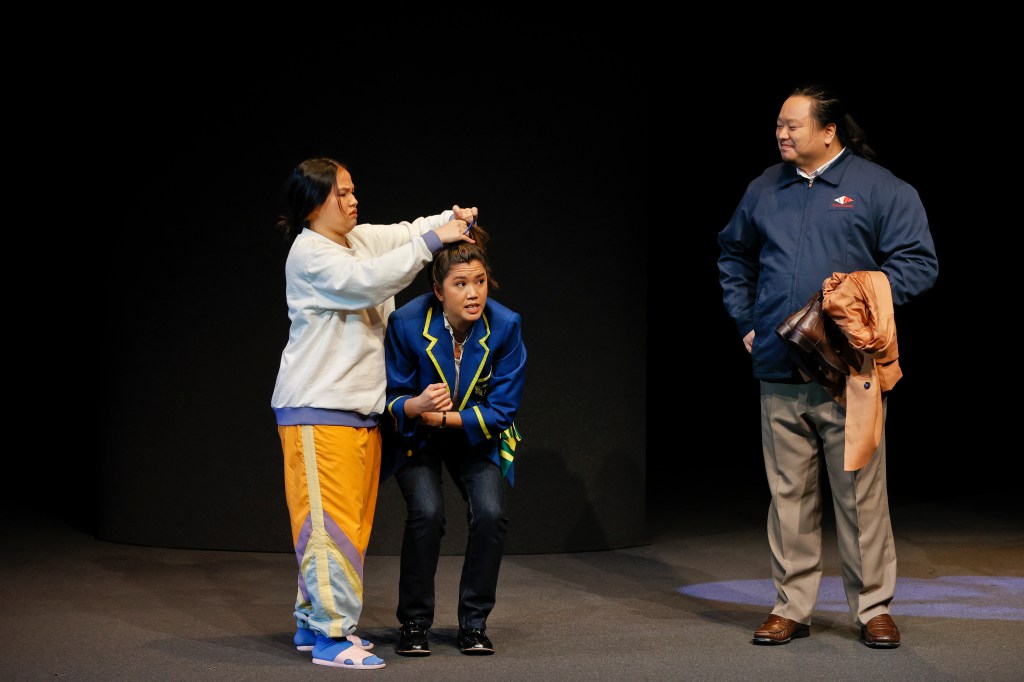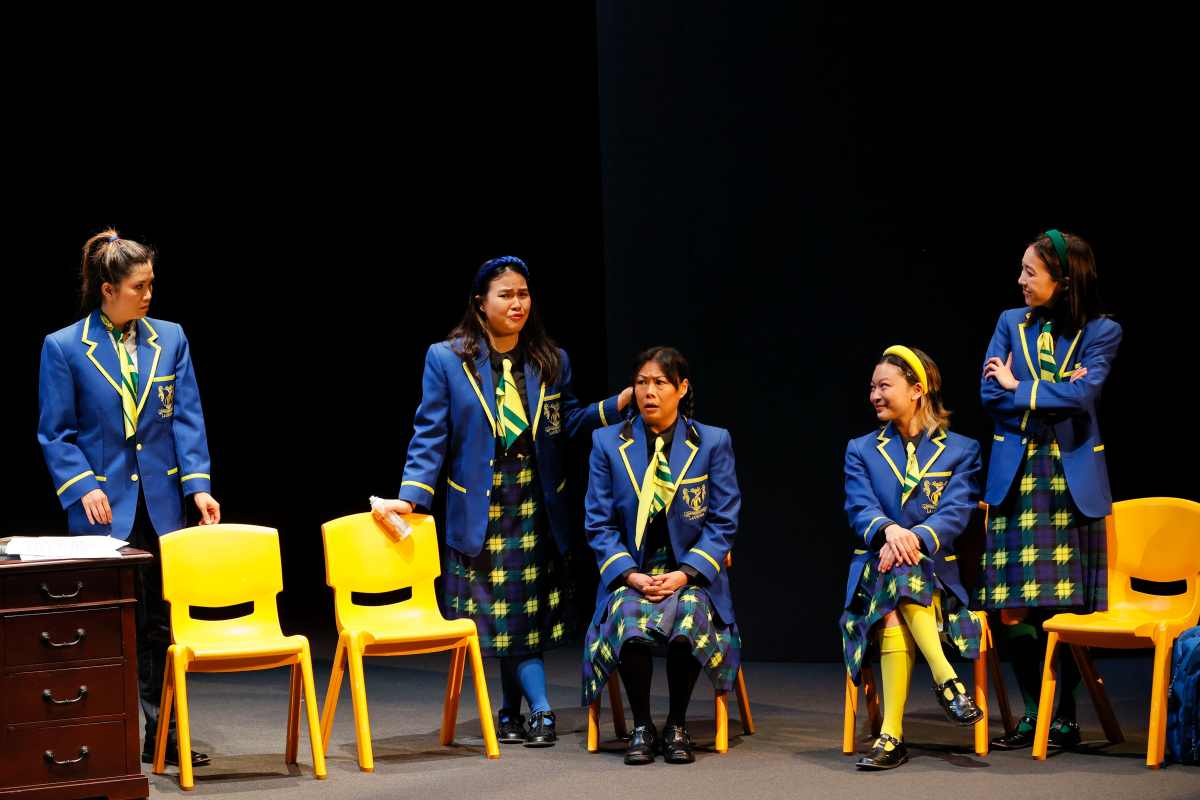Are young adult stories having a moment in the theatrical sphere? It’s interesting to note that not too long ago, Melina Marchetta’s Looking for Alibrandi (1992) was adapted by the Malthouse Theatre and Belvoir. The well-loved book focused on the trials and tribulations of an Italian teenager’s final year of school and her turbulent interactions with her migrant family. Now, alongside director Petra Kalive, playwright and comedian Diana Nguyen has translated Alice Pung’s equally acclaimed novel (published in 1994) for the stage.
The adaptation takes the gist of Pung’s story but plays around with it too. Teenager Lucy Lam (Ngoc Phan), whose parents are Chinese-Vietnamese refugees, manages to gain a foothold into a well-stocked, prestigious all-girls school through a scholarship. She is very much an outsider though, and never allowed to forget that her inclusion was mitigated by charity rather than meritocracy.
Laurinda is the name of the school. Its fancy, ostentatious grounds are far removed from Lucy’s own working class home where her mother ekes out a living sewing clothes in the family’s garage while her father does shift work in a carpet factory.
Initially Lucy is starry-eyed at the chance to vault past her humble circumstances but soon she’s ensconced in the power plays in the school ground, where gaining purchase on popularity is a brutal sport. As she tries to assimilate into this alien environment, Lucy’s sense of self starts to crumble.
The play starts with her as a nervous 30-something, now a teacher herself, and then in a way that’s never really explained, flashes back into her youth thanks to Linh (Gemma Chua-Tran), her quasi-alter ego who first turns up wearing a banana costume. (For those who don’t understand the reference it’s meant to represent Asians who are ostensibly ‘yellow’ on the outside but on the inside act as though they are are white. The significance of this taunt will become clear later on.) Linh shadows Lucy as she returns to school as a student. Invisible to everyone else except Lucy, she’s a spirited minx and acts as as both a conscience and sparring partner.
Laurinda is very much a tale that grapples with the usual evergreen and universal adolescent dilemma of identity, but one that’s filtered through a a cultural and class perspective. Lucy is torn between who she is and who she wants to be, especially when she falls in with the cool kids: the trio of popular white girls collectively called The Cabinet (Gemma Chua-Tran, Jenny Zhou, Chi Nguyen). They control the student body and rule the school, lording it over students and teachers alike. With a sense of power drawn from wealthy family connections that have funded Laurinda, The Cabinet are free to wreak havoc with impunity.
In this satire about generational privilege and entitlement, and an insidious private school culture that encourages an Us and Them mentality, the first thing theatregoers will notice is that the majority of the cast are Asian-Australians. It’s still a rarity on our stages – rare enough to be worth a mention. Even rarer is the speaking of Vietnamese on stage. In a wise editorial decision, no attempts were made to provide translation so if they don’t understand, the audience has to figure out meaning through context, and through the odd slippage of English between the torrent of Vietnamese.
All members of the cast play multiple roles (around 17 in all) and slip in and out of character with ease although in the same vein that the POC cast of Hamilton performed the roles of white characters, here too the Asian-Australian actors take on Anglo roles.
Though ostensibly set in the 90s, it’s disappointing that little attempt was made to dress up the stage to reflect this era, with only the definitive pop music of the day (Back Street Boys, Daniel Johns from Silverchair) as a reminder of place-setting.
The set is sparsely decorated, with props that are simply serviceable rather than remarkable. The only concession is the large video backdrop that pops up sporadically to extend the range of the school’s ambit or to feature a large-scale Linh in a variety of guises.
We are also reminded that this was the time when Pauline Hanson made her infamous ‘Asians swamping Australia’ speech; the racism she unleashed is reflected in the way the mostly Caucasian cohort of Laurinda treat the few non-white students in their midst: with pity and condescension.
Despite her proficiency in essay writing for instance, Lucy is still made to do remedial English due to her less than salubrious background. And later, when visiting one of The Cabinet’s home, she’s treated as an exotic Pygmalion-style project, malleable enough to be moulded into being the school’s trophy student. She’s obviously been set up to be the token non-threatening ‘good Asian’. Though crucial aspects to explore, these elements of covert and explicit racism are over-emphasised.
In fact overall, Laurinda lacks subtlety and perhaps a lack of trust in the audience’s ability to pick up nuance, thus relying on messages writ large. The humour and satire are broad, and while the largely young cast do an enthusiastic and proficient job, at times the play veers close to melodrama as it strains to entertain. Sure, the audience appreciated the dance elements for instance, as a form of light-hearted hijinks to even out the serious-minded elements of the text, but such additions weren’t needed to further the narrative.
Read: Musical review: 42nd Street
Indeed, the most effective and affecting scenes were the quiet ones that were nonetheless supercharged with emotion, in particular the scenes focused on young Lucy and her parents, beautifully played by Chi Nguyen and Roy Phung.

The conversations between them that touch on trying to better the family’s lives through education and climbing up the socio-economic ladder will be painfully recognisable to any second generation migrant child. There’s a sense of skewed priorities when Lucy has to decide between family responsibilities and the demands of extra-curriculum activities like rowing, because she would not otherwise fit into the Laurindan girl image of productivity.
Laurinda is about belonging, family, class and race, and shows how racism seeded in youth can travel with you into adulthood. It explores the courage an outsider needs in order to penetrate, assimilate, and if need be, resist and rebel against the status quo. This production makes a brave attempt to bring Pung’s novel to stage life but in its attempts to be tonally varied its ambition occasionally overreaches.
Laurinda
An MTC production
Based on the book by Alice Pung
Southbank Theatre, Melbourne
Director: Petra Kalive
Adapted by Petra Kalive and Diana Nguyen
Set Design and AV Concept and Design: Eugyeene Teh
Costume Designer: Karine Larché
Lighting Designer: Rachel Lee
Composer and Sound Design: Marco Cher-Gibard
AV Designer: Justin Gardam
Movement Director: Xanthe Beesley
Assistant Director and AV Composition: Roshelle Fong
Cultural Consultant: Alice Qin
Cast: Ngoc Phan, Fiona Choi, Gemma Chua-Tran, Georgina Naidu, Chi Nguyen, Ngoc Phan, Roy Phung, Jenny Zou
Tickets: from $39
Laurinda will be performed until 10 September 2022.
